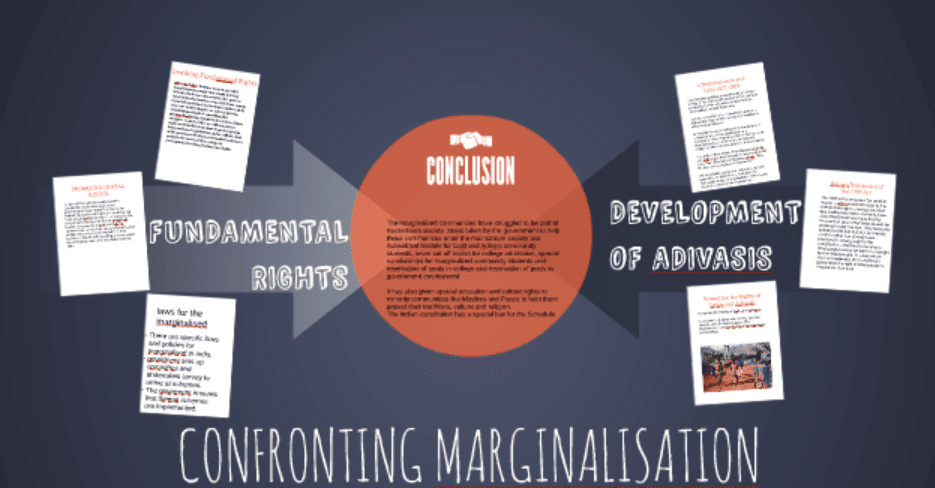NCERT Solutions for Class 8 Civics Chapter 8 - Confronting Marginalisation
This EduRev document provides a comprehensive set of NCERT solutions for the chapter "Confronting Marginalisation" from Class 8 Civics. Let's have a look!
Q1. List two Fundamental Rights in the Constitution that Dalits can draw upon to insist that they be treated with dignity and as equals. Re-read the Fundamental Rights listed on page 14 to help you answer this question.
Ans:The two fundamental rights that Dalits can draw upon to insist that they be treated with dignity and as equals are as follows:
- Right to Equality: All persons are equal before the law. No citizen can be discriminated against on the basis of his or her socioeconomic background, caste, religion, etc. Every person has equal right of access to all public places.
- Cultural and Educational Rights: This includes the right to protect the culture language etc of different ethnic groups while at the same time allowing for access of education without any discrimination.
Q2. Re-read the story on Rathnam as well as the provisions of the 1989 Scheduled Castes and Scheduled Tribes (Prevention of Atrocities) Act. Now list one reason why you think he used this law to file a complaint.
Ans:The Scheduled Castes and the Scheduled Tribes Prevention of Atrocities Act, 1989 seeks to punish those who humiliate or ill-treat the members of dalit or tribal groups. Rathnam sought the support of the law, filing his complaint under the above Act to seek protection against the domination and violence of the powerful castes in his village.
Q3. Why do Adivasi activists, including C.K. Janu, believe that Adivasis can also use this 1989 Act to fight against dispossession? Is there anything specific in the provisions of the Act that allows her to believe this?
Ans:The Adivasi activists, including C.K. Janu, believe that Adivasis can use the 1989 Act to fight against dispossession because this Act guarantees the tribals the right not to be dispossessed from the land resources forcibly. They specifically pointed out that this Act merely confirms what has already been promised to the tribal people in the Constitution – the land owned by any tribal people cannot be sold to or bought by non-tribal people. In cases where this has happened, the Constitution also guarantees the right of the tribal people to repossess their land.
4. The poems and the song in this Unit allow you to see the range of ways in which individuals and communities express their opinions, their anger and their sorrow. In class, do the following two exercises:
(a) Bring to class a poem that discusses a social issue. Share this with your classmates. Work in small groups with two or more poems to discuss their meaning as well as what the poet is trying to communicate.
(b)Identify a marginalised community in your locality. Write a poem, or song, or draw a poster etc to express your feelings as a member of this community.
Ans: (a)In class, I would bring the poem "Where the Mind is Without Fear" by Rabindranath Tagore. This poem talks about a world where people are free from fear, prejudice, and oppression. It highlights the importance of equality, education, and freedom.
In small groups, I would discuss how the poet expresses the dream of a just and united society. The poet communicates that overcoming divisions and marginalisation is essential for progress and peace.
(b)In my locality, I have observed the struggles of the waste pickers who often face discrimination and lack of recognition for their essential work.
To express my feelings as a member of this community, I would write a short poem:
"Through alleys we walk, unseen and unheard,
Cleaning the streets, yet silenced by words.
Our work sustains, but where’s the respect?
Equality and justice—we humbly expect."
This poem conveys the dignity of their work and the need to address the unfair treatment they face. This activity helps me empathise with their challenges and advocate for change through creative expression.
This is the sample answer for reference. Students can make their own answers.
|
69 videos|431 docs|46 tests
|
FAQs on NCERT Solutions for Class 8 Civics Chapter 8 - Confronting Marginalisation
| 1. What is marginalisation? |  |
| 2. What are the effects of marginalisation on individuals and society? |  |
| 3. How can we confront marginalisation? |  |
| 4. What are some examples of marginalisation in society? |  |
| 5. Why is it important to address marginalisation? |  |


















